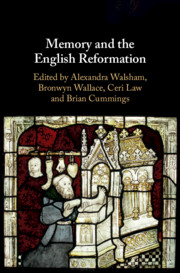
- Publisher:
- Cambridge University Press
- Online publication date:
- October 2020
- Print publication year:
- 2020
- Online ISBN:
- 9781108900157
Last updated 09/07/24: Online ordering is currently unavailable due to technical issues. We apologise for any delays responding to customers while we resolve this. For further updates please visit our website: https://www.cambridge.org/news-and-insights/technical-incident


The dramatic religious revolutions of the sixteenth and seventeenth centuries involved a battle over social memory. On one side, the Reformation repudiated key aspects of medieval commemorative culture; on the other, traditional religion claimed that Protestantism was a religion without memory. This volume shows how religious memory was sometimes attacked and extinguished, while at other times rehabilitated in a modified guise. It investigates how new modes of memorialisation were embodied in texts, material objects, images, physical buildings, rituals, and bodily gestures. Attentive to the roles played by denial, amnesia, and fabrication, it also considers the retrospective processes by which the English Reformation became identified as an historic event. Examining dissident as well as official versions of this story, this richly illustrated, interdisciplinary collection traces how memory of the religious revolution evolved in the two centuries following the Henrician schism, and how the Reformation embedded itself in the early modern cultural imagination.
‘This outstanding collection proves quite how essential the study of memory is for understanding religious history. Showcasing a rich variety of new ways to study the memory-making of the English Reformation, it will be a source of methodological and conceptual inspiration to all students of early modern memory and temporality.’
Judith Pollmann - Leiden University
‘In reconceptualizing the English Reformation from a single eruptive event to a protracted religious revolution of ongoing struggle and negotiation, this volume reassesses the nation’s devotional, liturgical, and monumental artefacts and practices, thereby setting for years to come the scholarly terms and parameters for understanding Protestant and Catholic interactions.’
Grant Williams - Carleton University
'… offers insights into the way in which the process of reform merged with memories of it, and bled into historical treatments, with influences on historiography lasting to the present day.’
Jacqueline Rose Source: Cercles
‘Scholarly interest in the social and cultural construction of memory has never been higher, … Memory and the Reformation is a remarkable collection of essays that does exactly what it sets out to do—show the reader how memory has been repudiated, rehabilitated, valorized, and memorialized, intellectually and materially.’
Autumn Reinhardt-Simpson Source: Reading Religion
‘This is that rare academic volume that is worth every penny of its purchase price, because readers will find themselves returning to it again and again. This book is a triumph.’
Mark Rankin Source: Reformation
‘This is that rare academic volume which is worth every penny of the purchase price, because readers will find themselves returning to it again and again. This book is a triumph.'
Mark Rankin Source: Routledge Taylor and Francis Group
 Loading metrics...
Loading metrics...
* Views captured on Cambridge Core between #date#. This data will be updated every 24 hours.
Usage data cannot currently be displayed.